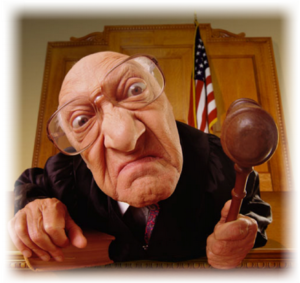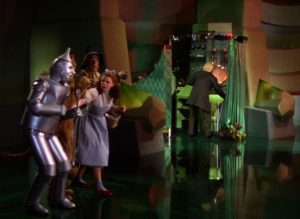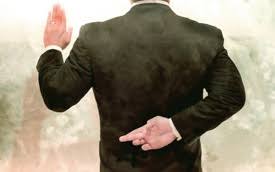The Delusion of Good Faith Judging

The concept of written legal rules—of the law itself—assumes that their content is fixed and ascertainable. The rule of law likewise depends on citizens having advance notice of what they can and cannot do, pursuant to clear, knowable directives. Legal scholars expend enormous energy pontificating about the appropriate techniques judges should apply in the course of constitutional interpretation: textualism, originalism, and so forth. Libertarian theorists argue strenuously that judges must be given greater authority—through “judicial engagement”—over the political branches. Each day, lawyers across the country trot off to court, briefs in hand, hoping to convince a black-robed judge–enthroned behind a raised, magisterial bench—that the relevant legal rules, properly construed, compel a ruling in favor of their client.
This entire enterprise rests on the premise that judges, having taken an oath to uphold the Constitution and laws, will actually make a good faith effort to do so. The bedrock postulate of our legal system is that judges will, in making their decisions, fairly interpret the relevant text, and issue rulings based on the actual words written down by the lawmakers who enacted them. That is, by submitting ourselves to the authority of the judiciary, the polity relies on them to do their job honestly and honorably. The august trappings of the judicial branch, complete with marble columns, solemn ceremonies, and incantations of “your Honor,” are calculated to inspire confidence–if not awe.

But what if judges routinely did not make their decisions honestly and in good faith? What if they simply made up things to suit their own personal predilections? Or lifted a finger into the wind, and issued decisions based on what they think is the most popular outcome, or what would elicit the most favorable reaction from whatever social milieu is most influential to them? Or ruled, like ventriloquist dummies, based on the latest intellectual fashions holding sway in the legal academy, or at the New York Times and Washington Post? What if all the pomp and circumstance accompanying judging, like the fire and smoke belching from the fearsome Wizard of Oz, amounted to no more than the scheming “man behind the curtain”? In other words, what if judges weren’t really acting in good faith?

In that event, judges would be exposed as mere charlatans—feckless office-holders violating their oaths and abusing the public trust. We would have a serious fraud on our hands—a hoax being perpetrated on the American public. In short, we would have an institutional crisis. Yet, based on recent en banc decisions from the Seventh and Second Circuits, it seems clear that a disturbing number of federal appellate judges are unwilling to apply the law, in this case the clear and unambiguous text of Title VII of the Civil Rights of 1964. These judges, perhaps entranced by the Siren Song of the progressive chorus that favors the LGBT agenda, have construed Title VII’s prohibition of sex discrimination to include sexual orientation discrimination, even though Congress has repeatedly declined to amend the statute to cover sexual orientation.

The relevant statutory language states that “It shall be an unlawful employment practice for an employer to fail or refuse to hire or to discharge any individual, or otherwise to discriminate against any individual with respect to his compensation, terms, conditions, or privileges of employment, because of such individual’s race, color, religion, sex, or national origin.” 42 U.S.C. section 2000e-2(a)(1) (emphasis added). Sexual orientation is plainly not included as a protected category, and it is nonsensical to believe that Congress would have banned such discrimination in 1964. “Sex” is not the same as “sexual orientation,” and it is an obvious lie to conflate the two.
I have written previously about the underlying cases from the Seventh Circuit (Hively v. Ivy Tech Community College, 853 F.3d 339 (7th Cir. 2017)) and the Second Circuit (Zarda v. Altitude Express, Inc., 883 F.3d 100 (2d Cir. 2018)) for Law and Liberty, here and here, and I will not repeat those criticisms. Suffice it to say that Title VII is a straightforward text, unlike many complicated federal statutes. If judges cannot be trusted to honestly interpret the word “sex,” in a run-of-the-mill statute barely 50 years old, how can they be trusted to construe the text of our 230 year-old Constitution? Or, more to the point, if judges are willing to lie about Title VII, why should they be taken seriously at all? Doesn’t such brazen dereliction of their judicial duty deprive them of their moral authority?
As reported by Alison Frankel in Reuters, the employer in the Altitude Express case is seeking review by the U.S. Supreme Court of the Second Circuit’s February 26, 2018 decision:
The U.S. Supreme Court doesn’t have to explain or justify its decisions to accept or reject requests for review, but a pair of newly filed petitions present an awfully strong case that the moment has come for the justices to decide whether gay and lesbian employees are protected from workplace discrimination under Title VII of the Civil Rights Act. One petition was filed by Altitude Express, a New York skydiving outfit accused of firing instructor Donald Zarda after he told a customer he was gay. In February, you may recall, the 2nd U.S. Circuit Court of Appeals held that Zarda’s estate could bring Title VII claims against Altitude Express because the law’s prohibition against sex discrimination encompasses discrimination based on sexual orientation…. Altitude Express, represented by Saul Zabell of Zabell & Associates, said the 7th and 2nd Circuits’ decisions “departed from more than 50 years of established precedent” from every other federal appellate court to have ruled on the scope of Title VII protection for gay and lesbian employees. Its petition called on the Supreme Court to step in to resolve the circuit split.
Tellingly, the news report characterizes the Second Circuit’s decision as “protecting” gay and lesbian employees from workplace discrimination, not as a blatant failure to apply the clear language of the statute.
According to Frankel’s report, the chances of the Supreme Court granting review in Zarda are heightened by the fact that a second cert petition was filed by an employee who unsuccessfully sued his employer for “anti-gay discrimination,” complaining about the opposite—i.e., correct–result from the Eleventh Circuit:
Gerald Bostock claims he was fired from his job as a child welfare services coordinator for a Georgia county’s juvenile court system when his employer found out he is gay. On May 10, a three-judge panel at the 11th Circuit ruled in an unpublished, per curiam decision that Bostock cannot sue Clayton County under Title VII because the law does not bar discrimination based on sexual orientation. Bostock’s lawyer, Brian Sutherland of Buckley Beal, had simultaneously asked the 11th Circuit to reconsider en banc its binding precedent on the scope of Title VII protection. The 11th Circuit denied that request when it issued its per curiam decision. Sutherland then hustled to get his petition to the Supreme Court a mere two weeks later.
The issue at stake in these cases goes beyond support of or opposition to the LGBT agenda. If legal protection is to be extended to gay and lesbian employees in the workplace, it should be done by Congress (which has repeatedly declined to do so). Judges who simply invent such a right, out of personal sympathy for the cause, conformity to groupthink, or vanity, forfeit their status as neutral decisionmakers and reveal themselves to be political actors. Such judges are not acting in good faith, and therefore are not really “judging” at all. They are faking, expecting the public to fall for it. Like a magician badly-performing a card trick, or a sloppy sleight-of-hand, this time the audience was not fooled.

The Supreme Court should grant cert in Zarda and rebuke the activist judges who have made a mockery of their oaths.
Thank you, Mike Ramsey at The Originalism Blog, for the kind mention!


































